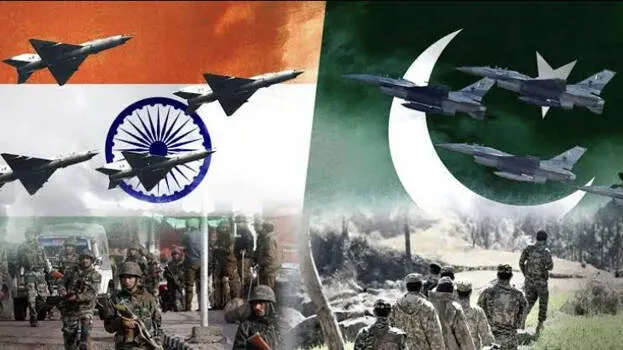

The India-Pakistan conflict, which has been going on for the past four days, had raised serious concerns that it could escalate into a war at any moment. It was thought that the ceasefire, which was the auspicious result of military-level talks between the two countries, would end with an agreement. Although the ceasefire came into effect at 5 pm yesterday, Pakistan was seen violating it late at night. While the United States and Saudi Arabia were holding lengthy talks with both countries to avoid a conflict between the two nuclear-armed countries, Pakistan, which was humiliated by India's heavy retaliations and powerful strikes, directly informed India of its readiness for a ceasefire. The fact that it was Pakistan that expressed willingness for a ceasefire will strengthen India's strength, position and reputation globally as a politically and militarily strong country.
Pakistan's Director General of Military Operations called India's DGMO at 3:30 pm yesterday, and expressed his readiness for a ceasefire. India, which has been responding to all situations of tension and provocation with complete restraint and dignity for the past seventeen days after the Pahalgam terrorist attack, accepted Pakistan's request. The official confirmation was given by the Foreign Secretary and the Army Chiefs immediately after. The military-level follow-up talks after the ceasefire will be held on Monday at a venue acceptable to both countries. There will also be a discussion between the Foreign Ministries. However, despite creating a sense of peace, things are slipping away after Pakistan's attack late last night. The Indian Ministry of External Affairs, which confirmed the Pakistani provocation on the border, said it is closely monitoring the situation. No one can doubt that India will retaliate strongly to any attack. India has asked the administration to give appropriate instructions to the Pakistani army.
Although the ceasefire was decided at the military level between India and Pakistan without the direct intervention of a third party, the role of the US and Saudi Arabia in the peace talks was not small. US Secretary of State Marco Rubio had a long phone conversation with the Pakistani army chief yesterday. After that, he called Indian External Affairs Minister S. Jaishankar and explained Pakistan's position, and Saudi intervention also took place. After all this, there was a telephone conversation between the heads of military operations of the two countries. It is possible that the US and Saudi Arabia have given Pakistan the option of directly announcing their willingness to cease fire in a way acceptable to India. No amount of vile lies and fake news spread by Pakistan against India prevented India from accepting the ceasefire. India's conduct in this regard will definitely be discussed internationally.
Every day after the Pahalgam terror attack, we were preparing for a strong response. The will of India's responsible government was clear in the military operation called 'Operation Sindoor', which was quite emotional but well-planned. The people of the country thought that if India was attacked, it would definitely retaliate because of their faith in the central government. Prime Minister Narendra Modi and the team he led were successful in this regard. Not only did the Prime Minister's Office work round the clock, but Modi personally monitored every military operation till dawn. The opposition also supported all the decisions of the government and gave the message that the country is united in eliminating the terrorists. India's armed forces also proved that the country's security is safe in their hands. All these were things that aroused a sense of pride in every Indian.
India's strong, friendly relations with countries including the US and Saudi Arabia also helped in ending the conflict situation after the Pahalgam terror attack. India did not resort to a hasty attack even after the brutal attack by Pakistani terrorists in Pahalgam, Kashmir on April 22, in which 26 tourists were killed. The military operation, codenamed 'Operation Sindoor', launched on May 7, targeted only terrorist camps in Pakistan-occupied Kashmir and the border areas. Despite continuous Pakistani provocations in the following days, our strikes were only on terrorist camps and launch pads from which missiles and drones were fired at India. Two school students were killed in shelling by the Pakistani army on populated areas along the border of Jammu and Kashmir and Punjab. This means that India has maintained the utmost restraint even in its defence and unrestrained strikes. Pakistan's provocations and violations of the ceasefire after its announcement will pave the way for Pakistan's destruction.